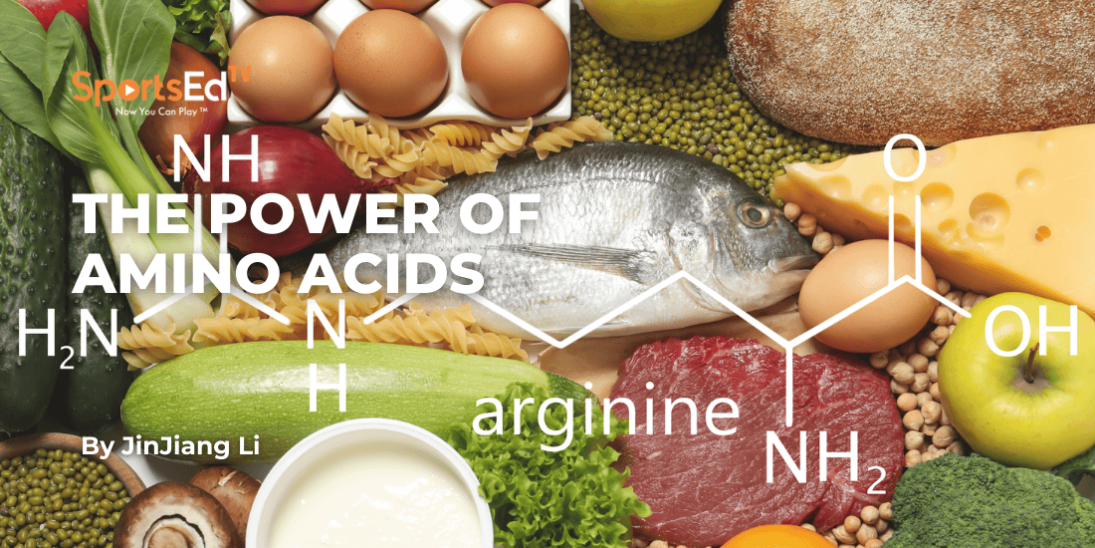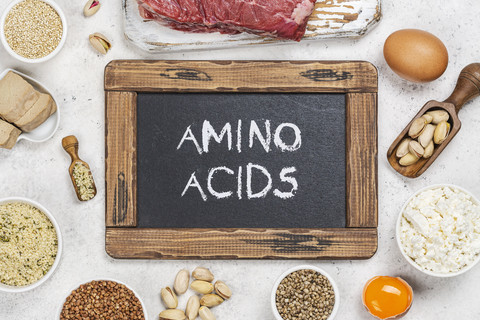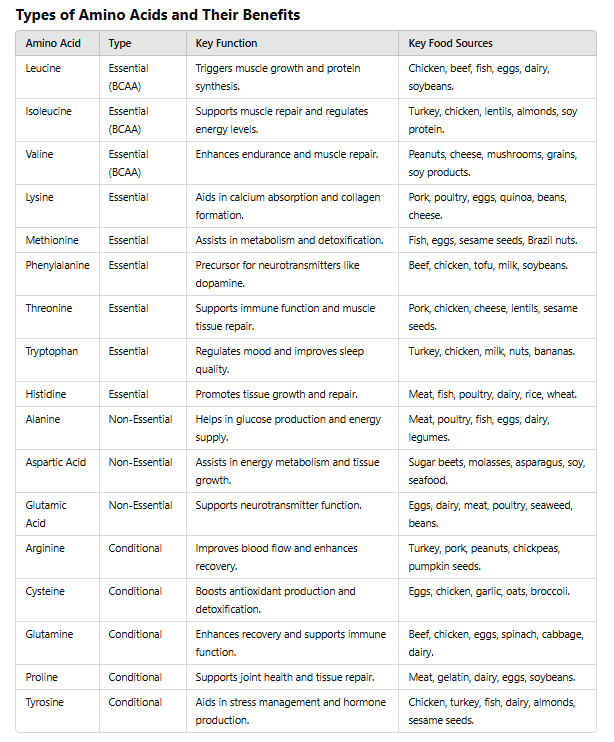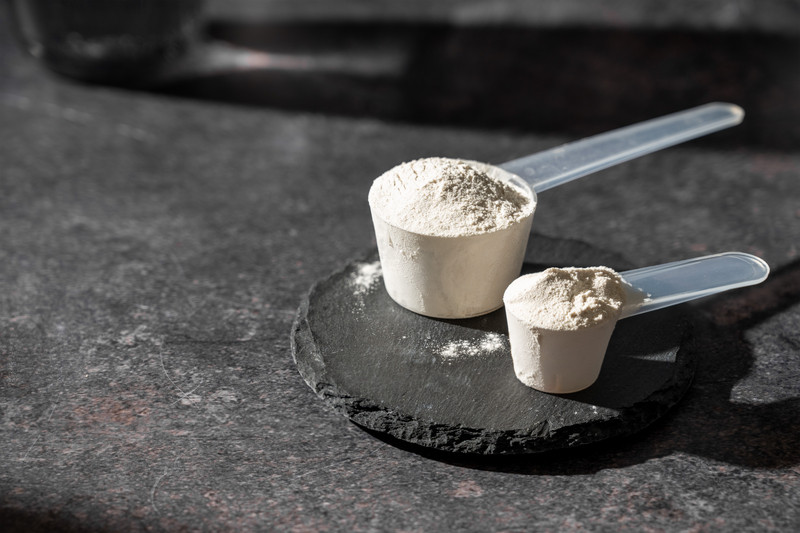Health, Nutrition, Strength And Conditioning
Welcome and thanks for visiting...

The Power of Amino Acids: Fuel Your Muscles and Unleash Your True Strength

Are you looking to maximize your athletic performance and unlock your full potential? Look no further than the power of amino acids. These tiny building blocks of protein hold the key to fueling your muscles and unleashing your true strength.
Amino acids play a critical role in muscle repair, growth, and recovery. When you engage in intense physical activity, your muscles undergo stress and breakdown. Amino acids provide the necessary fuel to rebuild and repair these muscles, enabling faster recovery and helping you push through plateaus.
However, not all amino acids are created equal. Branched-chain amino acids (BCAAs) are especially potent when it comes to muscle protein synthesis. Leucine, one of the three BCAAs, acts as a trigger for muscle growth, signaling your body to build new muscle tissue.
Whether you're a professional athlete or a gym enthusiast, incorporating amino acids into your diet can give you a competitive edge. From improved muscle strength to enhanced endurance, these powerful compounds have the ability to transform your athletic performance.
Don't settle for mediocrity. Harness the power of amino acids and push your limits to achieve greatness.
What are amino acids?

Amino acids are organic compounds that serve as the building blocks of proteins, which are essential macromolecules in the body. They are composed of carbon, hydrogen, oxygen, and nitrogen and play a crucial role in various biological processes. There are 20 standard amino acids that combine in different sequences to form proteins, and they can be categorized into three main groups: essential, non-essential, and conditional amino acids. Essential amino acids cannot be synthesized by the body and must be obtained from dietary sources, while non-essential amino acids are produced internally. Conditional amino acids are usually not essential but may become important during times of stress or illness.
The significance of amino acids extends beyond their role in protein synthesis. They are involved in numerous metabolic pathways and physiological functions. For instance, amino acids contribute to the production of hormones, neurotransmitters, and enzymes. They also play a role in energy metabolism, serving as precursors for glucose and other vital molecules. This multifaceted functionality highlights the importance of incorporating a balanced array of amino acids into your diet for optimal health and performance.
Understanding the structure and function of amino acids is vital for athletes and fitness enthusiasts. By recognizing how these compounds impact muscle function, recovery, and overall well-being, you can make informed dietary choices and potentially enhance your athletic performance. In the following sections, we will delve deeper into the importance of amino acids, specifically for muscle growth and strength.
Importance of amino acids for muscle growth and strength
Amino acids are indispensable for muscle growth and strength due to their role in protein synthesis. When you engage in resistance training or high-intensity workouts, your muscle fibers experience microscopic damage. This damage triggers a process known as muscle protein synthesis, where amino acids come into play by repairing and rebuilding the muscle tissues. The rate at which this process occurs can significantly influence your muscle growth, strength gains, and overall recovery.

Leucine, one of the branched-chain amino acids (BCAAs), is particularly noteworthy for its anabolic properties. It acts as a key regulator in the muscle protein synthesis pathway. Research has shown that leucine can stimulate the mTOR pathway, which is essential for muscle growth. This signaling pathway encourages the production of new muscle proteins, allowing for better adaptation to training stimuli. Therefore, ensuring adequate intake of leucine and other amino acids can enhance your body's ability to build and maintain muscle mass.
Moreover, the presence of amino acids in the bloodstream during and after exercise can help mitigate muscle breakdown. When your body is in a catabolic state—such as during intense physical activity—amino acids can serve as a source of energy, preventing the depletion of muscle tissue. This protective mechanism underscores the importance of amino acids not only for muscle building but also for preserving existing muscle mass, particularly during calorie deficits or intensive training phases.
Different types of amino acids and their benefits
Amino acids can be divided into three categories: essential, non-essential, and conditional, each offering distinct benefits. Essential amino acids are those that the body cannot produce on its own and must consume through food. Nine essential amino acids are included: leucine, isoleucine, valine, lysine, methionine, phenylalanine, threonine, tryptophan, and histidine. These amino acids are crucial for muscle growth, repair, and overall health, making them a fundamental aspect of any athlete's diet.
Non-essential amino acids, on the other hand, can be synthesized by the body. Although they are not required to be ingested through food, they still play vital roles in various metabolic processes. Examples include alanine, asparagine, aspartic acid, and glutamic acid. These amino acids contribute to energy production, immune function, and the synthesis of neurotransmitters, showcasing their importance for maintaining overall health and athletic performance.
Conditional amino acids are typically produced by the body but may become essential during periods of stress, illness, or intense training. Some prominent conditional amino acids include arginine, cysteine, glutamine, proline, and tyrosine. For athletes, glutamine is particularly important as it helps replenish glycogen stores, supports immune function, and aids in recovery after strenuous exercise. Understanding the different types of amino acids and their unique benefits can assist athletes in tailoring their nutritional strategies to optimize performance and recovery.

How amino acids fuel your muscles during workouts
During workouts, amino acids play a critical role in fueling your muscles and sustaining energy levels. Your body requires a continuous supply of energy as you exercise, and amino acids can serve as an alternative energy source. When glycogen stores become depleted, especially during prolonged or intense exercises, the body can break down amino acids through a process called gluconeogenesis to produce glucose. This mechanism ensures that your muscles remain fueled and functional throughout the duration of your workout.
Branched-chain amino acids (BCAAs)—which include leucine, isoleucine, and valine—are particularly important during exercise. They can be oxidized in the muscles, providing an additional energy source during prolonged physical activities. Studies have shown that supplementing with BCAAs before or during workouts can reduce fatigue and improve endurance, allowing you to push through challenging sessions and achieve better performance outcomes.
Moreover, the presence of amino acids in the bloodstream during exercise can help reduce muscle protein breakdown. When you engage in physical activity, your body enters a catabolic state, where muscle tissue is at risk of being broken down for energy. By supplying your muscles with amino acids, you can mitigate this breakdown and maintain a more favorable anabolic environment, promoting muscle preservation and growth. This balance between anabolism and catabolism is crucial for athletes seeking to maximize their performance and achieve their fitness goals.
The role of amino acids in muscle recovery and repair

Muscle recovery and repair are vital components of any training regimen, and amino acids are instrumental in facilitating these processes. After an intense workout, your muscles undergo repair as they work to heal the micro-tears caused by physical exertion. This is where amino acids come into play, providing the necessary building blocks for synthesizing new proteins to repair and strengthen muscle tissue. Consuming a sufficient amount of amino acids post-exercise can significantly enhance recovery and ensure that your muscles are primed for future workouts.
One key aspect of recovery is the timing of amino acid intake. Research suggests that consuming protein or amino acids within a specific window—often referred to as the "anabolic window"—can optimize muscle recovery. This period generally occurs within 30 minutes to two hours after exercise, during which your muscles are particularly receptive to nutrients. By providing your body with a source of amino acids during this time, you can elevate muscle protein synthesis and decrease muscle soreness, enabling a quicker return to training.
Additionally, certain amino acids, such as glutamine, play a crucial role in reducing muscle soreness and enhancing immune function following intense exercise. This is particularly important for athletes who train frequently, as heavy training loads can compromise immune health. By incorporating amino acids into your post-workout nutrition strategy, you can support recovery, minimize muscle damage, and maintain overall health, allowing you to perform at your best consistently.
Foods that are rich in amino acids

Incorporating foods rich in amino acids into your diet is essential for maintaining optimal muscle health and performance. Animal-based protein sources are typically the most complete, containing all nine essential amino acids in sufficient quantities. Foods such as chicken, beef, fish, eggs, and dairy products are excellent sources of high-quality protein. For instance, a serving of chicken breast provides a substantial amount of leucine, which, as previously mentioned, plays a vital role in muscle protein synthesis.
Plant-based sources of protein can also provide essential amino acids, although they may not be as complete as animal proteins. Foods such as quinoa, soy, lentils, chickpeas, and nuts can contribute to your amino acid intake. Quinoa, for example, is a complete protein source, containing all nine essential amino acids, making it an excellent choice for vegetarians and vegans. Additionally, combining different plant-based proteins, such as rice and beans, can help create a complete amino acid profile.
Incorporating a variety of amino acid-rich foods into meals can significantly enhance one's amino acid intake. Aim to include protein-rich foods in every meal and consider snacking on high-protein options such as Greek yogurt, protein bars, or nuts. By prioritizing amino acid-rich foods, one can support muscle growth, recovery, and overall athletic performance.
Amino acid supplements for muscle building

Amino acid supplements can be a convenient way to ensure you meet your nutritional needs, particularly for athletes and those engaged in intense training. These supplements are often formulated to provide specific amino acids, such as branched-chain amino acids (BCAAs) or essential amino acids (EAAs), making it easier to consume them in concentrated doses. BCAA supplements, in particular, have gained popularity for their ability to promote muscle recovery, reduce muscle soreness, and enhance exercise performance.
One of the primary advantages of amino acid supplements is their rapid absorption. Unlike whole food sources, which require digestion, amino acid supplements can be quickly utilized by the body. This makes them an ideal option for pre-workout or post-workout consumption. Many athletes choose to take BCAA supplements before or during workouts to help sustain energy levels and reduce fatigue. In contrast, others prefer to consume EAAs after exercise to maximize muscle recovery and growth.
While amino acid supplements can be beneficial, they should complement a well-rounded diet rather than replace whole food sources. Whole foods provide not only amino acids but also other important nutrients, such as vitamins and minerals that are crucial for overall health. When incorporating amino acid supplements into your regimen, consider using them strategically around your workouts to optimize their effectiveness and support your muscle-building goals.
Recommended dosage and timing of amino acid supplements

Determining the appropriate dosage and timing for amino acid supplements is crucial to maximizing their benefits for muscle growth and recovery. While individual needs may vary based on factors such as body weight, training intensity, and overall dietary intake, general guidelines can help you establish an effective supplementation routine. For branched-chain amino acids, a common recommendation is to consume 5 to 10 grams before or during workouts. This dosage can help to reduce muscle fatigue and enhance exercise performance.
Essential amino acids (EAAs) are often recommended at a dose of 10 to 20 grams post-workout to promote muscle recovery and synthesis. Consuming EAAs shortly after exercise can help replenish amino acid levels, stimulate muscle protein synthesis, and support the repair of damaged muscle tissue. Timing is critical; therefore, it is advisable to consume these supplements within the anabolic window, which is typically within 30 minutes to two hours post-exercise.
In addition to workout-related consumption, incorporating amino acid supplements throughout the day can help ensure that your body has a steady supply of these vital nutrients. For individuals engaged in intense training or those with higher protein needs, using amino acid supplements as a mid-morning or mid-afternoon snack can help maintain optimal amino acid levels and support overall muscle health. As with any supplementation, it is important to listen to your body and adjust your intake based on your personal experiences and fitness goals.
Potential side effects of amino acid supplementation
While amino acid supplementation can offer numerous benefits, it is important to be aware of potential side effects that may arise from excessive intake. High doses of certain amino acids, particularly in supplement form, can lead to imbalances and may cause gastrointestinal discomfort, including bloating, diarrhea, or nausea. Additionally, individuals with specific medical conditions, such as kidney disease, should consult with a healthcare professional before starting any amino acid supplements, as excessive consumption can impose further strain on the kidneys.
Another consideration is the potential for amino acid imbalances when relying too heavily on supplements without adequate dietary intake of whole foods. Consuming a broad range of amino acids from various sources is essential for supporting overall health and preventing deficiencies. Overemphasis on a single type of amino acid, especially in high doses, may disrupt the delicate balance of amino acids in the body, leading to unintended consequences.
Lastly, it's vital to choose high-quality amino acid supplements from reputable brands to minimize the risk of contamination or harmful additives. Always read labels carefully and consider third-party testing to ensure purity and potency. By being mindful of dosage, timing, and quality, you can maximize the benefits of amino acid supplementation while minimizing potential side effects.
Harness the power of amino acids for maximum muscle growth and strength

In conclusion, amino acids are fundamental for anyone looking to enhance their muscle growth, strength, and overall athletic performance. Their role in protein synthesis, energy metabolism, and recovery cannot be overstated. By understanding the different types of amino acids and their unique benefits, you can tailor your nutrition to better support your training goals.
Incorporating amino acid-rich foods into your diet, along with strategic supplementation around workouts, can provide the necessary building blocks to fuel your muscles and aid recovery. Whether you are a seasoned athlete or just starting your fitness journey, harnessing the power of amino acids can help you push through plateaus, recover faster, and ultimately achieve your desired results.
As you embark on your journey to optimize your performance, remember to prioritize a well-rounded diet, listen to your body's needs, and consider the benefits of amino acid supplementation. With the right approach, you can unleash your true strength and maximize your potential in the gym and beyond. Embrace the power of amino acids and watch as you elevate your athletic performance to new heights.









